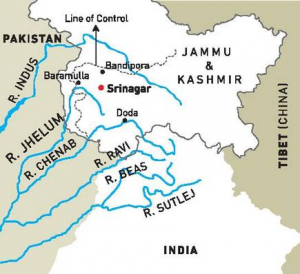Indus Water Treaty
What is the Indus Water Treaty (IWT)?
- Signed in the year 1960 by former Prime Minister Jawaharlal Nehru and the then President of Pakistan, Ayub Khan, the Indus Water Treaty is an agreement that was made to chalk out the control over the 6 rivers that run across India and then Pakistan into the Indus basin.
- This treaty was signed following the partition of the subcontinent.
- On an international level, the IWT has been seen as one of the most successful cases of conflict resolution. It is so because India and Pakistan, ever since IWT was signed, have engaged in 4 major wars but the treaty has stayed in place.
Which rivers belong to India and which ones to Pakistan?
- The Indus Waters Treaty was signed in 1960 after nine years of negotiations between India and Pakistan with the help of the World Bank, which is also a signatory.
- Precise details were laid out about how the water will be divided.
- While Jhelum, Chenab and Indus (3 western rivers) were allocated to Pakistan, India received the control of Ravi, Beas and Sutlej (3 eastern rivers).

- In effect, Pakistan got 80% of the water from the Indus river system and India 20%.
- If disputes arose, the two parties would try to solve them bilaterally first. Appointing a “Neutral Expert” and approaching the International Court of Arbitration are other options.
- The treaty also stated that aside from certain cases such as specified domestic, non-consumptive and agricultural use permitted to India, no storage and irrigation systems can be built by India on the western rivers.
Why in News?
- After a gap of more than two and half years Indian and Pakistani delegations have begun the 116th Meeting of the Permanent Indus Commission in New Delhi.
- The meeting is being viewed as part of the broader process of normalisation of bilateral ties between the two neighbours.
- The last meeting of the Permanent Indus Commission was held on August 29, 2018.
Key Issue
- Among the key points on the table was evolving a procedure to solve differences on technical aspects governing the construction of the Ratle run-of-the-river (RoR) project on the Chenab in the Kishtwar district of Jammu and Kashmir.
- According to the terms of the IWT, India has the right to build RoR projects on the three ‘western’ rivers — the Chenab, Jhelum and Indus — provided it does so without substantially impeding water flow in Pakistan downstream.
- Pakistan believes that the project’s current design does pose a serious impediment and has told the World Bank that it wants a Court of Arbitration (CoA) set up to decide on the issue. India says this is only a technical issue and mutually solvable.
- Earlier, in 2016, Pakistan had approached the World Bank raising concerns of India’s Kishanganga hydroelectric power project in Jammu & Kashmir.
Reference:
Subscribe
Login
0 Comments
